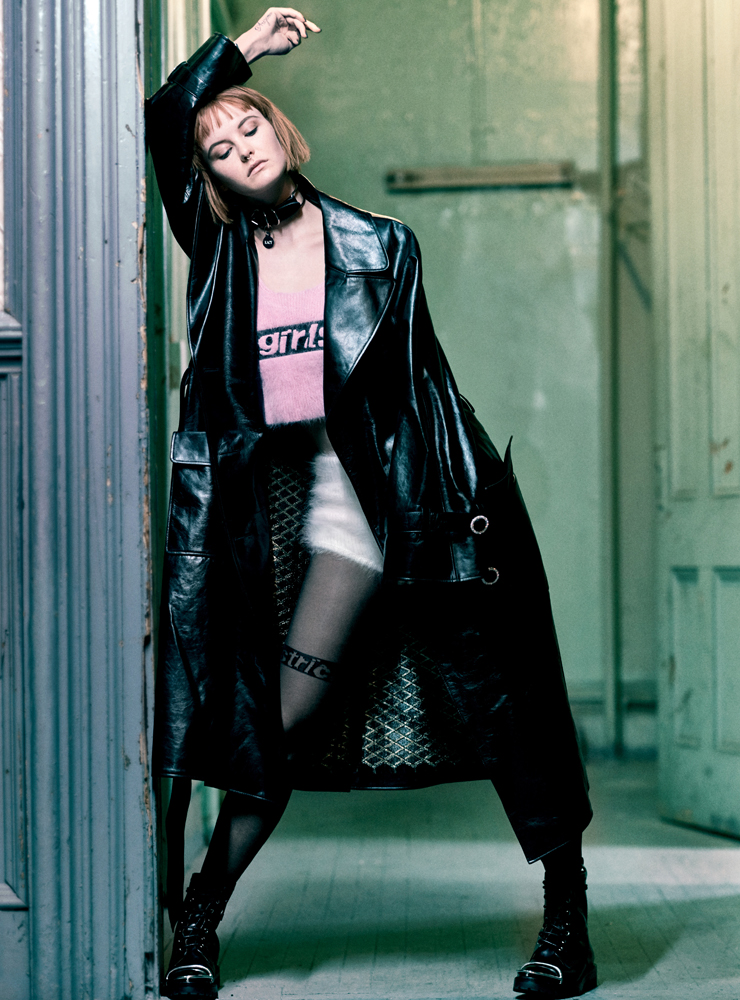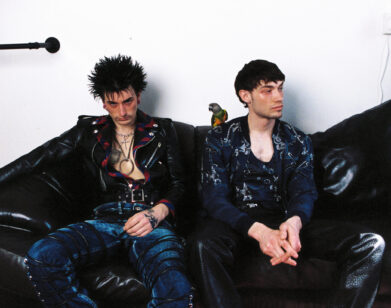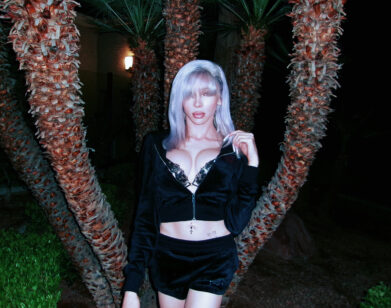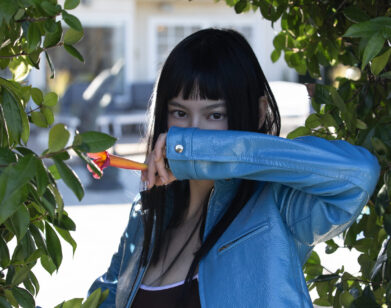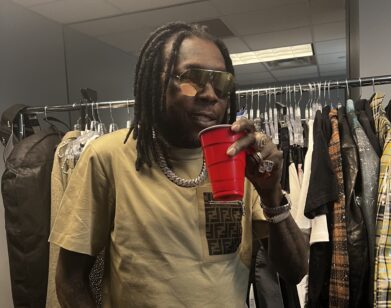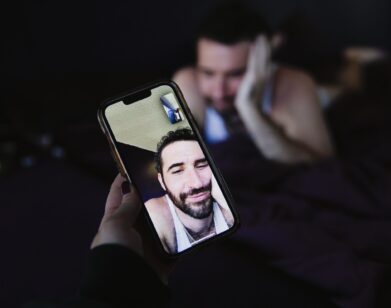Kacy Hill
I’ve been really assertive in how I want to sound and what I want my image to be. In my head, that’s the best example I can set. Kacy Hill
After listening to her hypnotizing electronic music, Kacy Hill’s admission during our conversation comes as a shock. “I listen to a lot of Chris Stapleton,” the 22-year-old says without a hint of irony. “I have this deep love for country music and really good songwriting.”
Hill emerged in 2014 with her breakthrough single “Experience,” on which she sings, “Language a nasty wall / Body feels it all / Lust rules the water sourcing each breath, each fall,” in a sultry, falsetto voice. She then released her Bloo EP last fall, a collection of five genre-blurring songs that stem from the experiences and struggles of everyday life, but transcend banality through poetic lyricism. “A lot of it is inspired by not just my relationships with love,” she explains, “but by my relationship with the world.”
Surprisingly, Hill, a classically trained saxophone and oboe player, wrote her first song only a few years ago, when she was 19. The Phoenix native moved to Los Angeles soon after high school, where she picked up work as a model (including with American Apparel) and as a backup dancer on Kanye West’s Yeezus tour. It was during the tour that she realized she wanted to pursue a career as a musician, so she quit after the first leg. Shortly thereafter, West heard “Experience” (the second song she ever wrote) and immediately signed her to his G.O.O.D. Music label.
By surface appearances, Hill might be mistaken for a carefully cultivated pop ingénue, but her image and music are the products of her own creative vision. When we spoke in late March, she was gearing up for the release of her full-length debut (due later this year) and about to embark on a U.K. tour.
EMILY McDERMOTT: You just finished touring North America with Jack Garratt and performing at SXSW a week ago. That was your first tour, right?
KACY HILL: Yeah, they were my first performances ever. It was amazing; it was like a missing link for me. It was the first tangible thing I had, where people enjoyed the music and reacted well. The first show I was terrified because it was new territory, and it was intense and not the smallest thing to start with, but the minute I got onstage, it all went away. You get lost in how much people are enjoying it and how much I enjoy it. I think it’s still a bit surreal that people take time out of their days to watch me sing.
McDERMOTT: You said touring provided this missing link. So what did you learn from performing?
HILL: I think the biggest thing is that I’ve been working in a bubble, basically. I’ve been in the studio the past two years and I didn’t have any real crowd reaction. As much as I can read that someone enjoys it on the internet, to me, that doesn’t feel as permanent or as genuine as seeing someone enjoying the music and being in it. That has been the biggest thing: realizing how my music translates to a live audience, and that helps the things I want to fix and the production of the album that I’m working on now.
McDERMOTT: And you’re working with Jack for the production of the album. Why did you choose to work with him?
HILL: I’ve been really precious with the music; like, I have the album written and I wanted a producer to elevate the production that’s already there. I went back and forth with a few people and the timing of it felt right with Jack. I think Jack understands the balance between cool, vibey stuff and has a good sensibility for pop music as well, and that was the angle I wanted to take on my music.
McDERMOTT: Can you tell me about your writing process?
HILL: I always have an idea of what I’m going to write about. The best songs I’ve written, I’ve been emotionally charged when I’m in the studio, and I’m just like, “Oh my God, I need to write about this.” It’s like talking to a therapist; I figure out my thoughts as I go, so it becomes very cathartic. The melody follows that idea and I build it all together, the production and the melody build up like a little pyramid. As far as creating, [daily life] is my inspiration. I’m an observer and kind of an introvert. I’m inspired a lot by women and by power. I’m inspired by moments and by things that I think are frustrating or beautiful. To be honest, I think every day is really fucking cool. Lower-middle-class struggling, that’s the world that I know better than anything else, so I gravitate to that and am really inspired by the inner turmoil of a normal life.
McDERMOTT: What’s the last experience that really made you want to write?
HILL: Yesterday I was in the studio, actually, and I wrote this song about how religious and most God-like figures are men and viewed as men. I think women are not acknowledged in any religious or power setting, and if they are, you usually have to be acknowledged as “a female blank” as opposed to just saying “a blank.” So I was frustrated; I’ve been a bit bothered by the climate of everyday misogyny and harassment as a female musician. I felt empowered by writing about this really honestly.
McDERMOTT: Have you struggled with that, especially coming into the music industry after being a model?
HILL: One hundred percent, but I think it’s a struggle inherent in being any female in the world. I think the internet is kind of an evil thing for a female musician because people don’t realize, or they do realize and don’t care, how harassing the things they say are, like sending graphically sexual things in DMs or comments. As much as I don’t want to acknowledge it, it’s impossible to not, and it’s shitty that you have to accept it as part of the job. You know, “Those guys, they’re just lonely, they’re just trolls.” It’s like, “No, that’s my career and this is my whole life. This is someone walking into the work office and saying, ‘Wow, I’d like to insert supersexual gross comment here.’ ” It’s not okay.
McDERMOTT: So what has helped you deal with and face the issue?
HILL: I’m still working on it. I think the best thing is to call them out, but a lot of the time, they don’t get it. I realize that I’m not going to change someone’s mind-set that has decades of deep-rooted misogyny, but calling out the culture of it is probably the best way to face it. The thing for me, too, is to be the strongest, most confident woman I can be, in my music and everyday life. When I feel like something is wrong or I feel uncomfortable, the best thing that I can do is say it, as opposed to being quiet. I say it in everything I do; I’m able to write it all myself and have creative control of my project and my image. I don’t have a man or anyone else telling me, “This is the music you should make; this is how you should look.” I’ve been really assertive in how I want to sound and what I want my image to be. In my head, that’s the best example I can set.
McDERMOTT: That actually makes me think of your music videos, how they’re close-ups of your face and don’t show your full body.
HILL: Yeah, those were really early on. It’s kind of cool to only see my face, but it’s not an intentional statement as far as “I’m not going to show my whole body,” because I don’t care. I’ve realized anyone can Google me and see my butt. [laughs] I think that was the intention in coming out with music as a new artist—it would have been really easy for me to ride off of the American Apparel stuff and images that already exist on the internet, but I wanted to separate myself from those two things. The American Apparel stuff, the modeling, I don’t think that is an accurate representation of myself as a creator. That’s myself as an instrument for someone else’s creative endeavors.
McDERMOTT: Having been this tool for somebody else to express their vision, which is also what you were doing as a backup dancer for Kanye, what was it like when you stepped into the forefront and started being yourself in front of people?
HILL: I always felt that I was capable of doing more when I was modeling. I was young, but in my head I felt really young and confused and unsure of what outlet to take, so I was satisfied with being an instrument for someone else’s vision and ideas. But the minute that I was on tour with Kanye, when we were in Madison Square Garden, I felt the energy of that crowd and was like, “I need to do this for myself. I need music.” So I left that tour after the first leg and started doing music. I think that was the right moment to do it because I had the ideas, the vision, and the drive for it. That was the first time I felt this release, and it felt therapeutic, where I wanted to do it every single day, and I didn’t get tired of it. I’ve never done that with anything.
McDERMOTT: Since making that decision, in the last two and a half years, how do you feel you have grown, both personally and musically?
HILL: I feel like I’m a different person. Musically, I started out like, “I’m just going to do what I want; I don’t care what anyone thinks. I just want to make cool and weird music.” Now I realize you can make cool music that means a lot but that’s also commercially digestible, and you don’t have to sacrifice anything in between. Technically, I’ve learned how to write better and be more straightforward in getting ideas across, which is a skill. Personally, I’m the happiest I’ve ever been in my life, and I think part of it is that I don’t feel bogged down by any relationship—not necessarily romantically, but I feel very independent and in control of my world. Anytime there’s something in my life that is not ideal or makes me unhappy, I’ve recently been able to find solutions, stand up for myself, and feel fulfilled.
EMILY MCDERMOTT IS INTERVIEW‘S ASSOCIATE ONLINE EDITOR.

